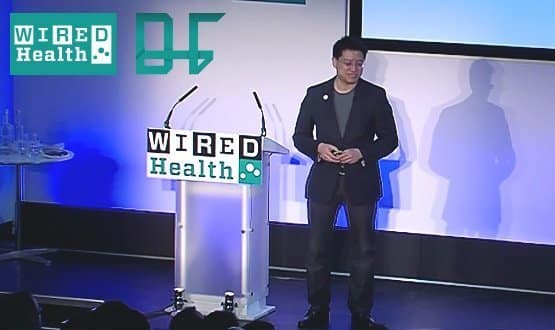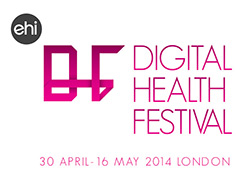Totally wired
- 7 May 2014

As technological advances give people more ways to track their own health and fitness, a range of new opportunities – and challenges – are opening up to the healthcare system.
Clinicians now have the potential to access more data about their patients than ever before, but they must find the best use for that information.
Commissioners and managers will be worried about how to do that in a financially viable way; while meeting the growing expectations of those focussed on the bright possibilities ahead.
Speaking at Wired Health, geographic health expert Bill Davenhall likened public health and personal medicine to two trains running down separate sets of tracks in the same direction.
“There’s either going to be a collision or a collaboration. That’s what I want [collaboration], but it might take a collision…to have those pieces of information working together for our benefit.”
The future’s bright…
As a general rule, enthusiasm – rather than concern with the realities of how the NHS is organised and funded – was the order of the day.
Attendees’ wrists sported a range of health and fitness trackers produced by Fitbit, Misfit and many others working in the growing wearable tech sector.
The audience of medical professionals and tech experts were keen to ogle the very latest gadgets in the exhibition.
And presenters expressed optimism about the potential clinical uses of fitness trackers and wearable sensors, particularly the volumes of patient data they can provide for analysis and potential diagnosis.
Among the companies to demonstrate this was fertility service DuoFertility, which uses a sensor to obtain 10,000 daily temperature measurements from a woman and generates a report for doctors with data about her ovulation cycle.
DuoFertility chief executive Claire Hooper said expanding the use of wearable sensors will allow GPs and other medical practitioners to keep an eye on their patients’ vital statistics even when they can’t see them in person.
“We’re able to monitor people entirely to get an idea of what’s happening in their lives on a daily basis, not just when they’re visiting their GP,” she said. “Parents of miracles didn’t just need miracles; they needed better data and better prediction.”
Jack Kreindler, a high-altitude medic and founder of Jointly Health, also spoke effusively about the growing affordability and power of sensors and how they can be used to monitor patients with chronic health issues such as cancer.
Kreindler drew laughs during his slideshow, which came complete with a picture of a Lego Darth Vader as an example of a patient who could benefit from wearable sensors to deal with his burns, quadriplegia and “really bad asthma.”
However, he wasn’t joking when he advocated making better use of the data streams that can be gathered from such technology.
Coupled with a remote patient monitoring and analytics platform, he argued, they could enable doctors to make “clinically intuitive” decisions and intervene days, weeks or even months before a patient falls seriously ill.
Sonny X Vu, chief executive of Misfit Wearables, said wearable technology is certain to develop further applications as developers work on ways to expand and improve their uses.
“Activity tracking, it’s such a version-one type of feature, and some of the ground-breaking uses we have coming, we don’t even know what they are yet.”
Filling in the blank canvas
Patient-facing mobile applications were also a popular topic, with those speaking about their creations keen to emphasise their ability to create a closer relationship between a patient and their doctor.
Bruce Hellman, chief executive and co-founder of uMotif Digital Health, said apps could be used as often as antibiotics as more patients and clinicians look at ways to gather health data and put it to use in a more effective way.
Hellman said the inspiration for his company’s software, which allows people to track their health using a range of data which can then be shared with their clinicians, came from his realisation about how little access GPs have to their patients.
“When I go back to my doctor in six months’ time, they have hardly anything on me. I’m a completely blank canvas: they have no idea where my health has gone or where it’s going.”
Former Goldman Sachs trader and healthcare entrepreneur Ali Parsa’s Babylon app, labelled as a “doctor in your pocket”, is also inspired by that disconnect between GPs and their patients.
The app gives patients the ability to arrange video consultations, order prescriptions and manage specialist referrals, and Parsa said it will include a monitoring function to measure key health metrics.
Transparent data
Davenhall, who spoke about being “hit by a train” when he suffered an unexpected heart attack in 2001, was understandably keen to see data collected by apps and sensors used to help people before it is too late.
“One of the things obvious in health is that we haven’t connected all the dots, we haven’t connected these huge amounts of data that people have spent their whole life generating.”
To Davenhall, connecting these dots via apps, and the devices they are on, is a key part of protecting our health – as well as that of children. “Our new admonition as our children leave the house will be… don’t forget your phone.”
However, with the controversy over the care.data programme to collect health data and make it available to researchers and others dragging on, the issue of data privacy was also a hot issue.
Unsurprisingly, those present were keen advocates for the free flow of data, as long as those providing it understood where it was going and how it could help them.
Hellman summed it up best, saying it was “critically important” for patients to support the move towards increased sharing of data if it is to succeed.
“When people understand where it’s going, who uses it, and who benefits, they’re increasingly happy to share it,” he said. “Let’s not get misconceptions stand in the way of how we use data for increasingly powerful purposes.”

The Digital Health Festival is continuing, and full details of all the conferences, social media and social events that have been set up under the Digital Health Festival banner are on its website. Don’t forget about the EHI Pub Quiz, which takes place in King’s Cross, London, on 14 May; we look forward to seeing you there!




